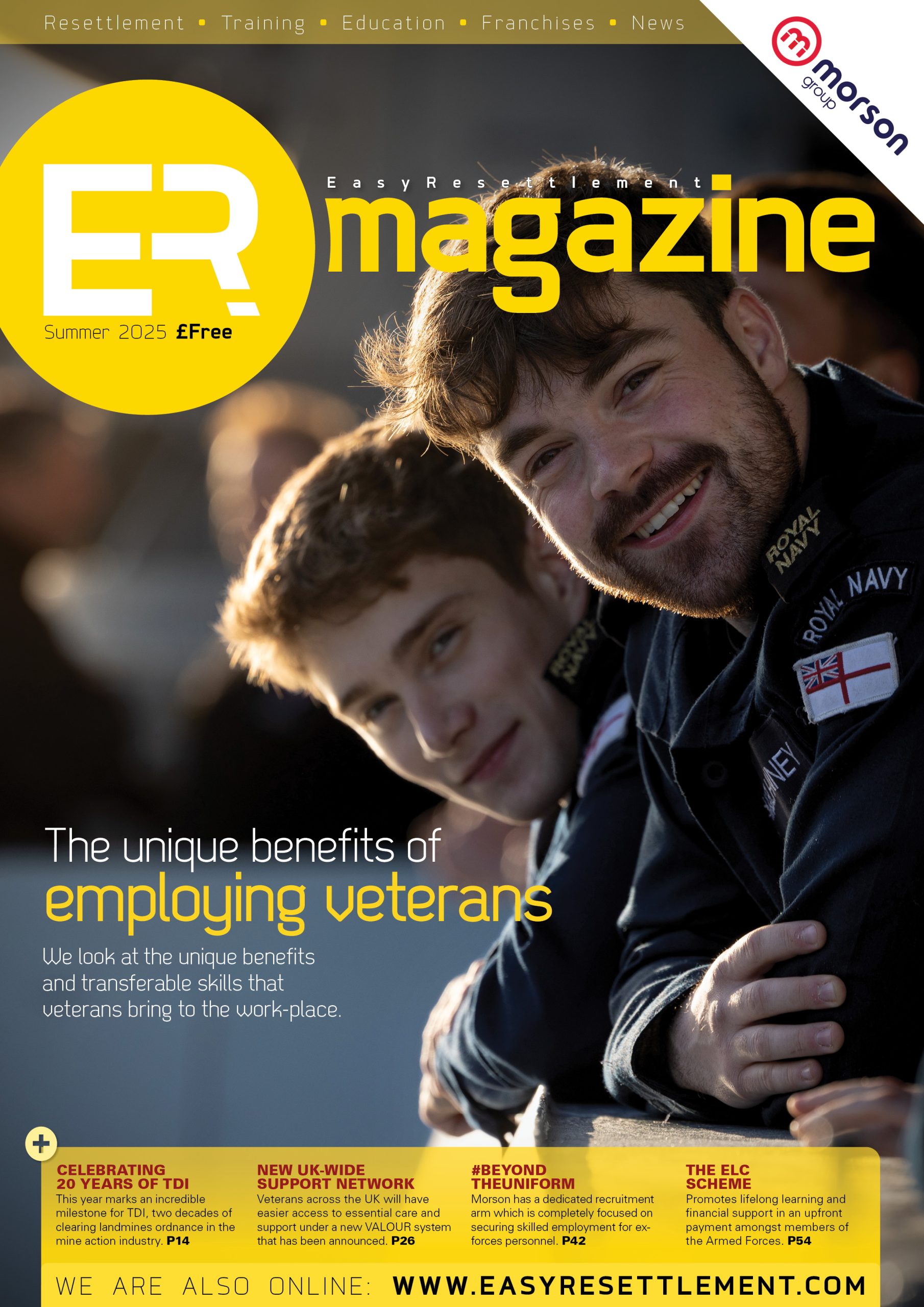SSAFA’s mentoring service expands
SSAFA, the Armed Forces charity, assists all service personnel, veterans and their families in times of need.
One particular time that inevitably causes stress, is the transition from a life in service to becoming a ‘civvy’. People react differently; some are delighted by the prospect of a whole new way of life, but others struggle with the huge change that is going to affect not just them but their whole family.
Kat, who used the SSAFA Mentoring service says: “I got in touch with SSAFA because I was suddenly faced with a situation where I was not going to have a home or a job. I’m going to do all the things that are classed as really stressful life changes pretty much in one go.”
Kat was serving in the RAF and was a single parent, who was struggling after the breakdown of her marriage. She had been unable to deploy because she was the primary childcare provider for her two children. The strain of this, as well as other factors, meant she was signed off work with stress and eventually medically discharged. Things were looking bleak for Kat and her mental health suffered.
“I was still living on camp, but when I was given an eviction notice through the door I had to apply for social housing because we were going to be homeless.
“It was in a very dark time; everybody had given up on me, but my mentor was there for me. Trevor was like a knight in shining armour. If I was having a tough day or if I needed help, he was always just on the other end of the phone.”
Trevor helped Kat in a practical way and was someone she could rely on in her times of need. Two years on and Kat has a full-time job, her own house and the children are doing well.
“It was reassuring to have a person who is there for you, who gets what you’re going through, who’s been in the military and knows how hard it is when you leave. I honestly wouldn’t be where I am now without him.”
SSAFA Mentors help the service person and their families with all aspects of transition into civilian life.
One mentee’s wife said: “After years of living in quarters you suddenly have to buy your own house. It is important to be near a good school because the kids get taken out of their boarding school and would probably find it harder to settle in to an inner-city comp. Affording that is impossible. I’ve moved all over the world with my husband’s job and I can only get unskilled work at the moment and my pension pot is quite low because of all the years I have been in and out of work. My husband and I find it difficult to talk about money and the future because we don’t know what our lives will look like with what we have.” Simply talking with their mentor went a long way to stabilising this Forces family’s fears for the future.
SSAFA mentors come from all walks of life and don’t necessarily need any military knowledge. However, some mentors find that coming from a military background really helps them to connect with others.
Tim, ex-Royal Air Force and SSAFA mentor said: “My favourite part is seeing the change in someone. They have referred themselves or someone else has referred them to our service and often they are hitting a bad patch. It could be lack of employment, struggling with money, housing or just the culture shock to them or their family of being on the outside. I have been in that situation. I understand what they are going through, and I hope it helps them to see that I managed, so I can help them through their tough times too.”
“It’s often just little things, like being on the end of a phone if something goes wrong, pointing out what help their family might be entitled to, or helping them set a monthly budget for house bills. Ultimately, understanding that change can be terrifying and supporting people through that is very rewarding. I feel like I’m giving something back. And it’s great to have someone who understands military humour too. You can miss that on the outside.”
Mentoring is the ideal voluntary role for busy people as the workload is flexible and can be heavy or light, to suit your personal circumstances.
Sarah, SSAFA mentor, military wife and ex-service child said: “I have a hefty full-time job and was looking for a volunteering role that could fit in around my other responsibilities. I really enjoy helping people and I think that, because my experience spans the military life and my profession is outside of that, I have a lot of experience I can draw on to help service leavers.”
Tony, ex-Army and SSAFA mentor, said: “I got into mentoring because someone wanted me to give them a reference for their own application to SSAFA. I looked into it and thought it sounded brilliant. I wish knew I had access to something like this when I left the Army. Transitioning wasn’t just tough on me, it was hard for my family too. I find it rewarding knowing we can work with families as well as the service person. I really enjoy helping people find their own solutions. There is a lot of support for volunteers too and I like that we feel part of a team.”
SSAFA’s mentoring service is expanding and more mentors from across the UK are needed. The mentoring scheme is fully supported by training, teamwork and regional managers and they are actively recruiting now. If you are looking for a voluntary role that will fit in around your lifestyle, provides recognised training and support, visit www.ssafa.org.uk/mentor. If you would prefer to speak to someone about the role, email mentoring@ssafa.org.uk.
CASE STUDY
A Day in the life of a Mentor
Compared to many volunteering roles, that of mentor is relatively simple and the workload is easy to balance, even if you have a busy life yourself.
John: “I work full time and have a family. I let all my mentees know this so we can work around both their and my schedules.
Today I was at work all day, after which I gave my mentee his weekly catch-up call, which lasted 10 minutes. I have looked after him for about four months now, from just before he left the Army and through his first few weeks on the ‘other side’. Today he told me about an interview he had been offered, and was a bit nervous about, so we scheduled a meet-up to run through a practice interview on Saturday afternoon. It’ll take about an hour or so and I’ll take that opportunity to check everything is OK at home and anything else I might be able to help him with.
Because my life is busy I have one mentee at a time and generally it takes up an average of two hours per week, spread over a month. If I had more time I would take on more mentees, but right now, one at a time is perfect for me. In general you sign up with a mentee for six months, but, there’s the option to extend this if needs be. On the other hand, some people need a steer in the right direction so don’t need you beyond the first few weeks.”
AMAZON AND SSAFA PARTNERSHIP
SSAFA is in a fortunate position to work closely with Amazon Military, who have joined SSAFA as a charity partner.
Amazon sponsored the recent Mentoring Wellbeing Conference in Oxford and continues to support and encourage it’s staff to take up voluntary mentoring roles with SSAFA.
Amazon Military are a dedicated team within Amazon UK who are largely veterans or reservists themselves. The members of Amazon Military voted for SSAFA as their adopted charity and support SSAFA whenever they can.

